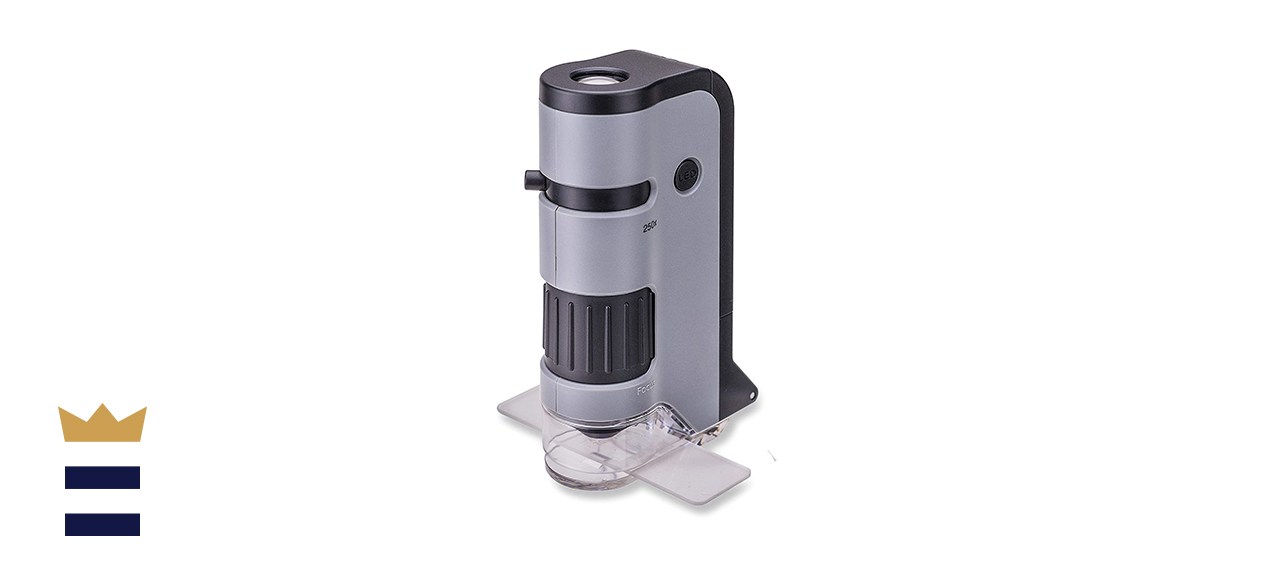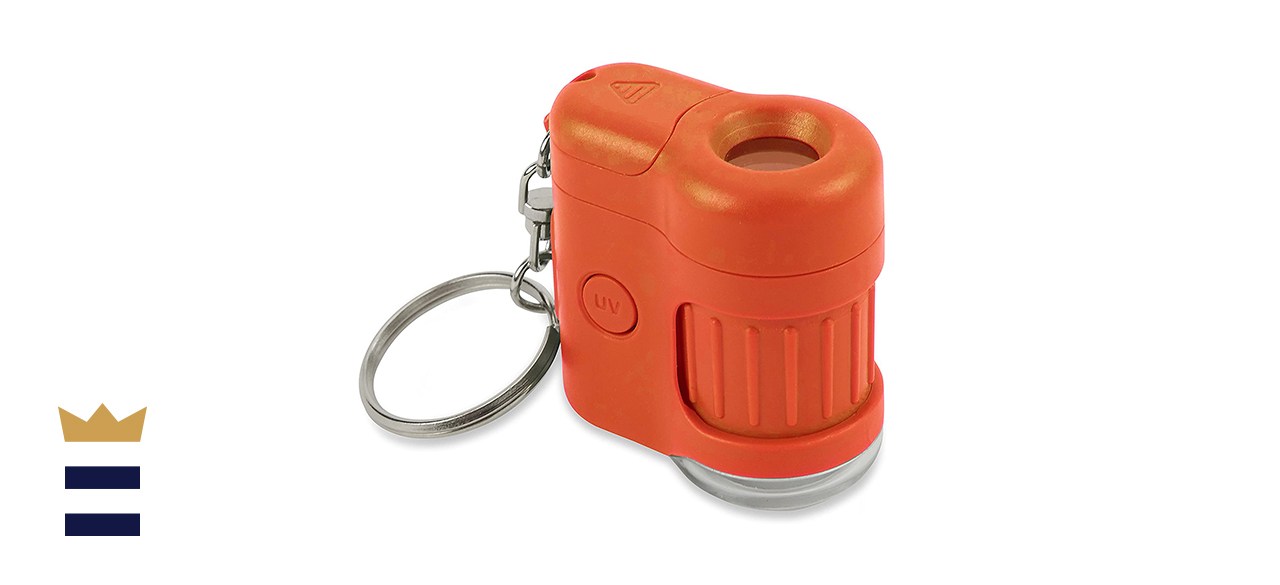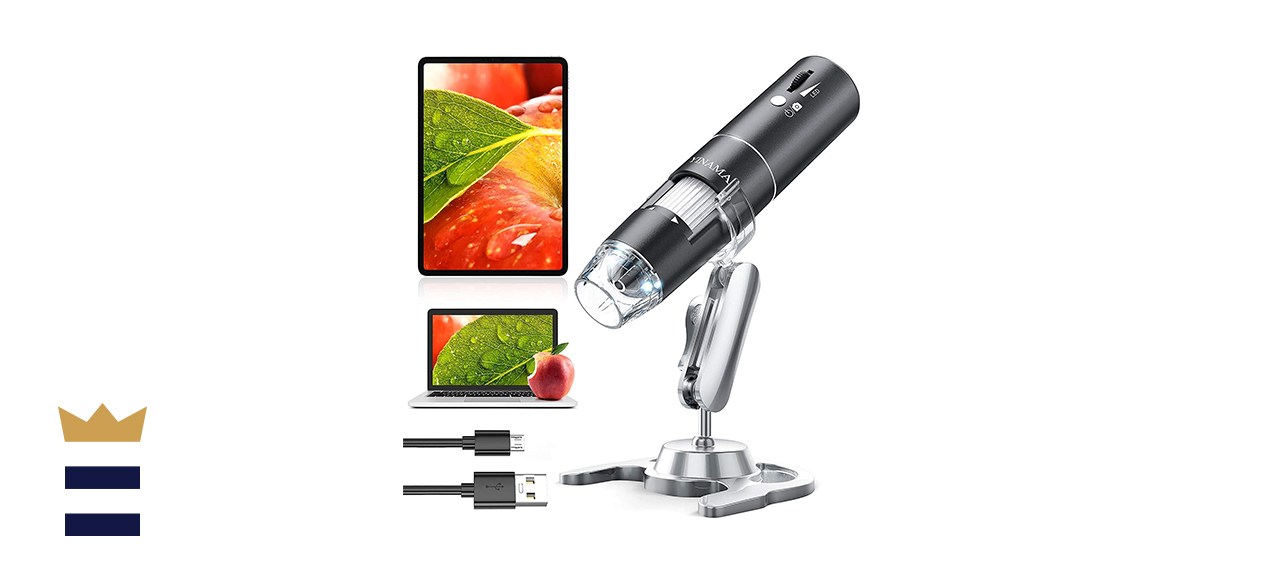Which pocket microscopes are best?
Pocket microscopes are popular with everyone from electrical engineers and botanists, who use them to inspect their work, to curious children interested in the world around them.
The Carson MicroFlip 100x-250x LED and UV Lighted Pocket Microscope allows both professionals and budding scientists to get up close and personal with their subject matter using prepared slides or by holding the device against what they want to view. It features a special clip that attaches the scope to your smartphone for easier viewing.
What to consider before you buy a pocket microscope
Expectations
While powerful pocket microscopes are available, they are not a substitute for properly designed and calibrated laboratory equipment. They can be challenging to use in some cases, easily losing focus and detail if moved too much due to the fact that most are handheld and not affixed to a stable base. Depending on the model you select, you may have difficulty using your pocket microscope in dim conditions.
Application
Consider what you will be using your pocket microscope for and where. If you will be working in low light or plan to explore the outdoors out of bright sunlight, you need to select a model that includes a built-in light source in the form of an LED. If you intend to use your device in the field, where it may be dropped or exposed to rough conditions, or plan to give the device to a child, purchase a model designed for rugged handling. Models that allow a connection to a phone or PC are great for people who have difficulty looking through a lens.
Intended user
Pocket microscopes can be fragile, and some are loaded with features that might stand in the way of simple use. If you are tech-savvy and somewhat familiar with the use of optical devices, then almost any type or model of the pocket microscope is usable. However, young children and those less interested in the finer aspects of using a microscope are better served by a more basic model with a singular focus on simple magnification.
What to look for in a quality pocket microscope
Size
Select a pocket microscope small enough to carry conveniently but not so tiny as to be challenging to use. Consider the size of your hands and your comfort level with operating minute dials and buttons.
Durability
Most pocket microscopes are designed to be portable, with some including a built-in keychain ring. However, some are more durable than others. It’s important to choose a model that is rugged enough to withstand travel and the inevitable jostling and friction it will be subjected to while stowed in a bag or pocket with other items.
Magnification power
One of the most important features to consider when looking for a pocket microscope is how many times it magnifies the object you are inspecting. While models that allow for up to 1000X magnification may be appealing due to their power, consider your usage with the understanding that too much magnification may make it very difficult to keep your subject centered and in focus.
Stand
Some models include an optional stand. This makes it easier to view and inspect your subject hands-free by keeping everything stationary. For especially powerful models, a stand can prove to be critical for getting the most out of your microscope.
Light
Many pocket microscopes include one or more LEDs that illuminate your subject for easier viewing. This is especially helpful in situations where you may not be exposed to direct sunlight or are using your device indoors.
Connectivity
Certain pocket microscope models allow you to connect to your PC or smart device via USB or Wi-Fi. This feature allows you to send the image to a screen of your choice for easier viewing and snapping photos.
Ergonomics
Select a microscope that is easy to hold and use. Because some of these devices need to be pressed directly against your eye to use, it’s important to find a unit that has a comfortable eyepiece. Choose a model that is easy to operate with easily accessible focal adjustments, LED power button and zoom features.
How much you can expect to spend on a pocket microscope
The cheapest pocket microscopes cost less than $10, but these models are more akin to toys than useful devices. While expensive models that include a base and advanced features can cost nearly $200, most users will find acceptable performance from microscopes in the $20-$60 range.
Pocket microscope FAQ
Can you take photos or video with a pocket microscope?
A. Yes. Models that allow connection to your PC, tablet or other device allow you to take photos and video via proprietary software. These transfer data through USB or Wi-Fi. Others include clamps that press the microscope’s eyepiece against the camera lens of your smartphone and require no special apps.
Can you attach a pocket microscope to a base?
A. Some pocket microscope models include a base you can attach for greater stability and ease of use. While attached, your pocket microscope looks and functions similarly to a traditional laboratory model, but will still fall short in terms of power and flexibility when compared to those devices.
Can you use traditional slides with a pocket microscope?
A. Some pocket microscope models can be used to examine slides. To do so, you need a model that includes a base with the clips to hold your slide in place, or one that includes a special attachment that holds the slide against the device’s lens and properly illuminates it.
What are the best pocket microscopes to buy?
Top pocket microscope
Carson MicroFlip 100x-250x LED and UV Lighted Pocket Microscope
What you need to know: This small, portable microscope gives you the option of using your smartphone to capture images through its lens.
What you’ll love: This microscope is small enough for travel but large enough to allow for 250X magnification and easy use. You can view slides using this device or use it in the field to directly examine electronics, plants or insects. It includes a special clip that allows you to both view and take photos with your smartphone.
What you should consider: This microscope’s phone clip can run into compatibility issues with some large, heavy phone models.
Where to buy: Sold by Amazon
Top pocket microscope for the money
Carson MicroMini 20x LED Lighted Pocket Microscope
What you need to know: Tiny and inexpensive, this pocket microscope is great for children and teachers.
What you’ll love: Featuring 20X magnification and LED illumination, this small device is rugged enough for kids. It includes a keychain ring for added convenience and is available in three colors.
What you should consider: This model is not very powerful and not intended for professional or scientific use.
Where to buy: Sold by Amazon and Staples
Worth checking out
YINAMA Wireless Digital Microscope
What you need to know: This microscope connects to your phone or PC via Wi-Fi and includes a flexible stand.
What you’ll love: With an adjustable LED light and magnification up to 1000X, this device allows you to easily view objects on your smart device using its free app.
What you should consider: This model only allows for digital display and therefore requires a connected device to use.
Where to buy: Sold by Amazon
Pocket microscope tips
- Clean your microscope’s lens with a dust-free, microfiber cloth or special camera lens wipe. Do not use paper towels or tissues as these can scratch delicate lenses.
- Have patience and work carefully while inspecting small objects. Due to magnification, any movement or shaking your hand makes while using a microscope can disrupt your viewing experience.
- Keep batteries or an appropriate charger at the ready. In many cases, the usability of your microscope depends on its ability to illuminate your subject with its built-in lights. Being left without power limits the usefulness of your device.
Sign up here to receive the BestReviews weekly newsletter for useful advice on new products and noteworthy deals.
Derek Walborn writes for BestReviews. BestReviews has helped millions of consumers simplify their purchasing decisions, saving them time and money.
Copyright 2021 BestReviews, a Nexstar company. All rights reserved.






